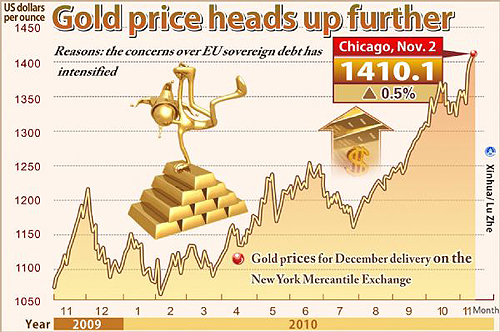|
 |
|
SOARING GOLD PRICE: Graphics shows the prices of gold in the past 12 months. The most active gold contract for December delivery jumped $6.9, or 0.5 percent, to finish at a record high settlement of $1,410.1 per ounce on the New York Mercantile Exchange on November 9, 2010. (LU ZHE) |
The U.S. Federal Reserve announced its adoption of the second round of quantitative easing, or QE2, in early November. The international market immediately saw rocketing prices for stocks, gold and wholesale commodities, as well as remarkable depreciation of the U.S. dollar, said Yi Xianrong, a researcher with the Institute of Finance and Banking at the Chinese Academy of Social Sciences.
"Essentially, the QE2 is relatively small in scale," Yi said in the Beijing Times. "It accounts for merely 3 percent of GDP of the year, lower than both U.S. QE1 and China's $586-billion stimulus package—14 percent of GDP. Compared to the refugee capital worth trillions of greenbacks on the international financial market, QE2 is almost negligible."
In other countries like Japan, quantitative easing policies have been in place for many years, but have not shaken the international market as much as the U.S.'s latest policy. The reason for this lies in the special status of the U.S. dollar in the international monetary system. With QE2, the Federal Reserve aims to lower long-term interest rates and stimulate investment and consumption by purchasing large amounts of government bonds.
What's unique about the international monetary system is the U.S. dollar-standard. That is to say, the greenback is not only the national currency of the United States, but also the main international currency.
Gold used to serve as the standard measure of different currencies and commodities in international trade. Such a system imposed restraints on the expansion and issuing of dollars. After the Bretton Woods system collapsed in the early 1970s, the U.S. dollar replaced gold as the standard, which enabled the United States to "manipulate" the world economy to some extent.
With the dominating status of its currency, the United States can issue dollars in accordance with its own interests and monetary policies, instead of following the supply and demand of dollars on the international market. As a result, monetary policies guiding international financial markets are essentially controlled by the Federal Reserve. Any change in U.S. domestic monetary policies inevitably has a significant influence on the global financial market.
Under these circumstances, the United States can balance its international revenues and expenditures by adjusting exchange rates at will. Meanwhile, other countries can only achieve external balance by changing the exchange rate of their own currency against the U.S. dollar.
The U.S. dollar-dominated international monetary system gave rise to two separate markets—the commodities market and the currency market. It is impossible to establish complete parity between the two since they are different in pricing mechanisms, supply and demand relations and operation.
As it stands now, the international monetary system has led to an unbalanced global economy. Deepening economic globalization and growing international trade need larger amounts of U.S. dollars, which cause the country's deficit to mount up while the supply of its currency continuously expands. In this situation, the U.S. dollar inevitably depreciates. In response, the United States puts even more dollars into circulation to reduce its deficit. Such a vicious circle eventually results in the imbalance of the global economy.
In taking advantage of the deficiency, large quantities of short-term capital floods into financial markets across the world to produce swift profits. "That is why QE2 jolted the global financial market upon its announcement," said Yi.
While taking into consideration QE2's ripple effect, China should closely examine the existing international monetary system based on the U.S. dollar. It should keep its eye on how international markets react to QE2, and how QE2 affects prices in international financial markets and the operation of the real economy. This will allow China to take precautions against systematic risks that the global financial market may incur.
QE2 has had a considerable impact on China's financial market, international trade and foreign exchange reserves. Gradually tightening monetary policies and bringing China's economy back to normal should be the Chinese Government's top priorities, Yi suggested.
"China should take effective measures to block the influx of refugee capital, keep asset price bubbles in check and prevent too much money from flowing into the real estate market," said Yi. Otherwise, excessive liquidity will endanger China's economy and make it difficult for China to counteract QE2's ripple effects, he said.
(Source: Xinhuanet.com) | 